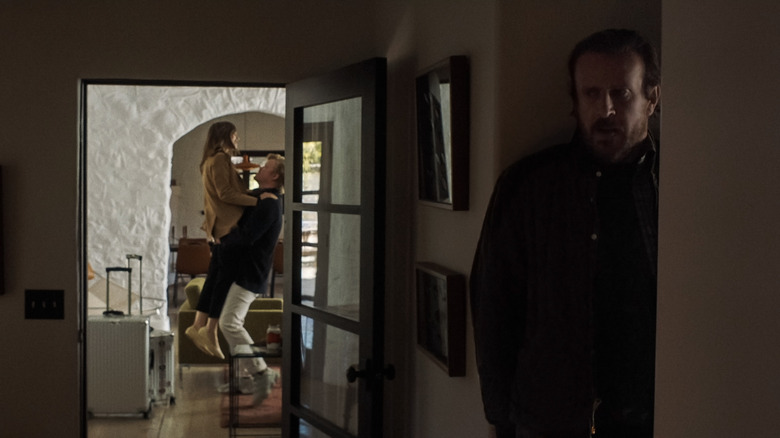Windfall Review: A Tightly Woven Thriller With Killer Performances
Tense situations tend to bring out the worst in people, and few situations are as potentially charged as a home invasion and hostage situation. In "Windfall," the latest from "The One I Love" director Charlie McDowell, three unnamed protagonists are put to the test when a random Nobody (Jason Segel) breaks into the vacation home of a filthy rich CEO (Jesse Plemons) for a little R&R when the CEO and his wife (Lily Collins) arrive unexpectedly. The movie was conceptualized and produced during the early parts of the pandemic, when everyone felt trapped in their homes and unsure of what was going to happen next, and those fears translate well to this claustrophobic film. "Windfall" is a brilliantly-executed minimalist thriller that delivers as much as its audience is willing to put in. It's lean and it's very mean, but "Windfall" is also the kind of tightly-knit character-driven thriller that stays with you long after the credits roll.
The marketing for "Windfall" refers to the film as "Hitchcockian," and those influences are present from the opening credits, presented in a vintage font while a haunting orchestral score plays. The opening titles set the mood, languidly fading in and out over the tranquil stone patio of the vacation home, the music the only thing that truly portends the horrors to come. We're introduced to Segel's Nobody as he wanders the property, establishing the layout of the house where we'll be spending the entire film, and without any dialogue, it's easy to understand who Nobody is. He's a sad sack, a lonely loser who haunts vacation homes in order to feel something other than the never-ending numbness of his own existence. Segel's performance is outstanding and is going to shock audiences who know him best as an affable goofball in big-screen comedies and as Marshall on "How I Met Your Mother." From the very first time we see this home invader, he has the appearance of a trapped animal, sick and starved and ready to lash out. When the CEO and his wife show up just a few minutes into the film and he's unable to sneak out undetected, that fear and hunger push him to do things he never imagined, like taking the couple hostage and demanding a ransom.
Plemons has proven that he's great at playing creeps in movies like "Game Night" and his episode of "Black Mirror," and the CEO of "Windfall" is yet another self-centered jerk with delusions of grandeur. He frequently tries to turn the tables on his uninvited house guest, quizzing him about his motives and personal life. The CEO is convinced that the invader must have some personal vendetta against him because he's successful and the invader isn't, and he uses this to belittle and berate his captor. Plemons and Segel trade barbs with the best of them, though it's hard not to feel sorry for Segel's everyman character despite his poor decisions. He's significantly more relatable than the rich and spoiled CEO, who complains about how difficult it is to be a rich straight white man in America, causing his wife to laugh in his face.
As great as both Segel and Plemons are, the movie wouldn't work without Collins and her character, a put-upon wife who is trapped in a marriage with a megalomaniac. The marriage woes are evident from the very first scene, in which the CEO is furious at his assistant for not filling the home with vases of fresh-cut flowers. His wife tries to get him to focus on her, and on having a nice time together, but he's obsessed with the flowers and his version of perfection and throws a bit of a tantrum instead. Collins is perfect opposite him as a character who is cool and collected without being cold, rounding out the trio of talented thespians.
"Windfall" never leaves the estate and follows these characters exclusively, keeping the action tightly centered and needle-sharp. A plan is arranged for Nobody to get his money and escape only 15 minutes or so into the movie, but that old adage about best-laid plans comes into play as everything that can go wrong, does go wrong. What begins as a pitch-black comedy soon develops into a taut thriller where no one is guaranteed to survive, and the climax has enough tension to feel like a cinematic panic attack.
A lean, mean comedic thriller
While "Windfall" hinges on its spectacular performances, it's important to mention that it is also beautifully crafted in every way. The screenplay, written by Justin Lader and Andrew Kevin Walker from a story they wrote with Segel and McDowell, has whip-smart dialogue and brilliant small moments of humor early on to provide much-needed pressure release. The film's music, by Danny Bensi and Saunder Jurriaans, is pure noir, and its sharp staccato strings pay homage to frequent Hitchcock collaborator Bernard Herrmann. The cinematography, courtesy of Isiah Donté Lee, is deceptively simple and beautiful, making great use of the location's natural light. The house and the grounds begin to feel like another character, with its orange groves, Zen garden, and elaborate landscaping. Everything about the world "Windfall" exists in is extravagant and slightly hollow, much like the CEO himself.
In an interview with Entertainment Weekly, McDowell explained that it was important to him that the audience be able to see parts of themselves in the main trio, and that's part of why their characters aren't given names or specific life details:
"We learned very little about these people previous to when the film starts, and we wanted the audience to project what they wanted onto these characters, and we didn't want to spoonfeed the audience with manipulating them to feel one way or another."
This minimalist approach was oddly refreshing. Background traits used in other movies to establish the characters and who we're supposed to root for as an audience have been completely removed, allowing us to judge for ourselves what kind of people our protagonists are. Whether the viewer identifies with Nobody, the CEO, or the wife depends on the viewer just as much as the film in an unusually morally ambiguous move that speaks to the movie's greater themes. After all, in a capitalist society, is it ever possible to truly be moral?
There isn't an ounce of fat on "Windfall," courtesy of editor David Marks ("The Night House"), who keeps the film moving along at a breakneck pace despite the majority of the action just being dialogue scenes. Fans of independent home invasion thrillers like "Hard Candy" and "I Don't Feel At Home in This World Anymore" are sure to love this twisted little addition to the sub-genre that wears its influences proudly. Every aspect of the production is nearly flawless, from the production design to direction to the performances, and it all builds to an absolutely perfect ending that's hinted at from the very beginning. If you're looking to get your heart rate up and your mind racing, there are few better ways to spend an afternoon inside than by checking out "Windfall" on Netflix.
/Film Rating: 9 out of 10

